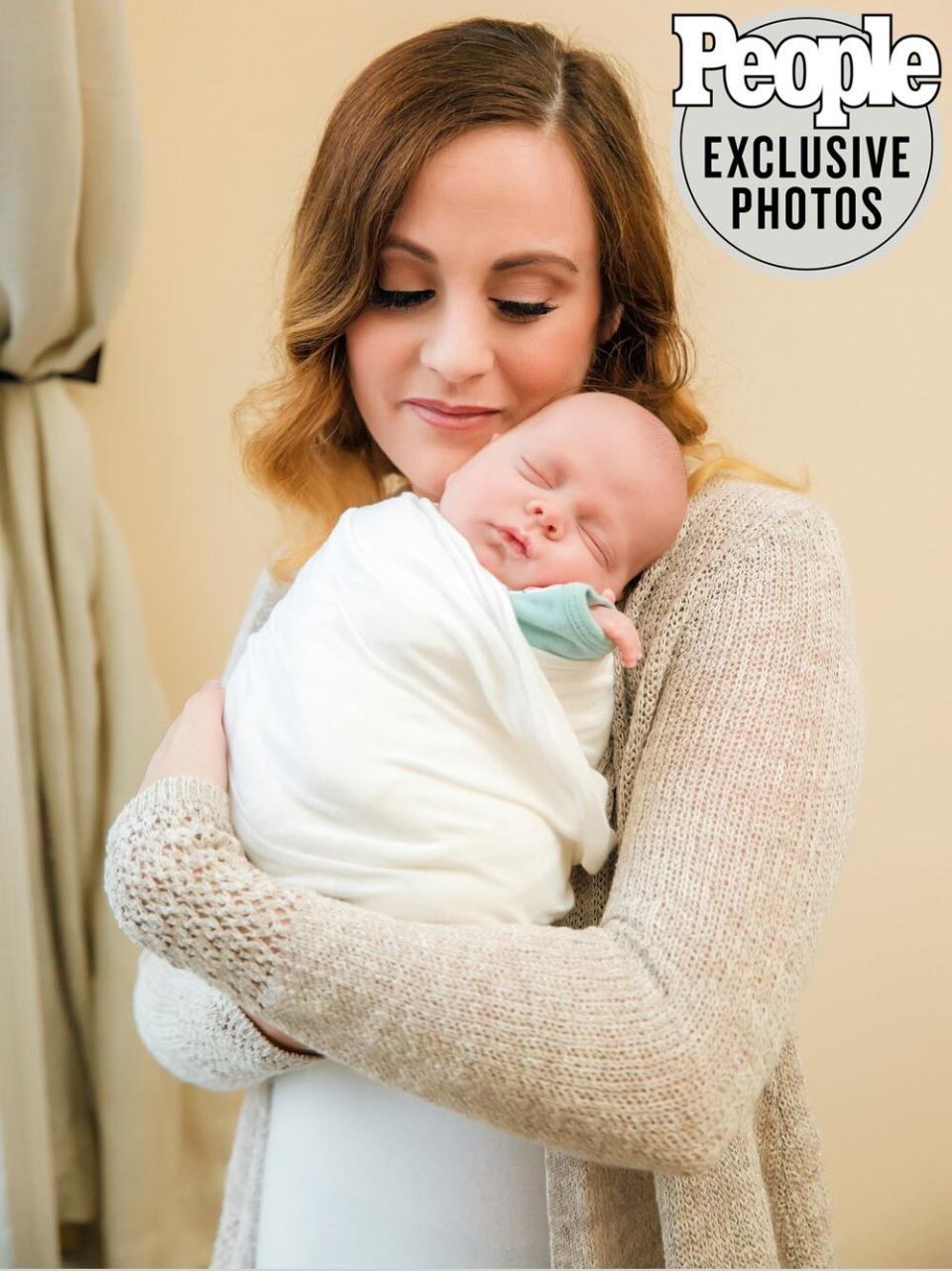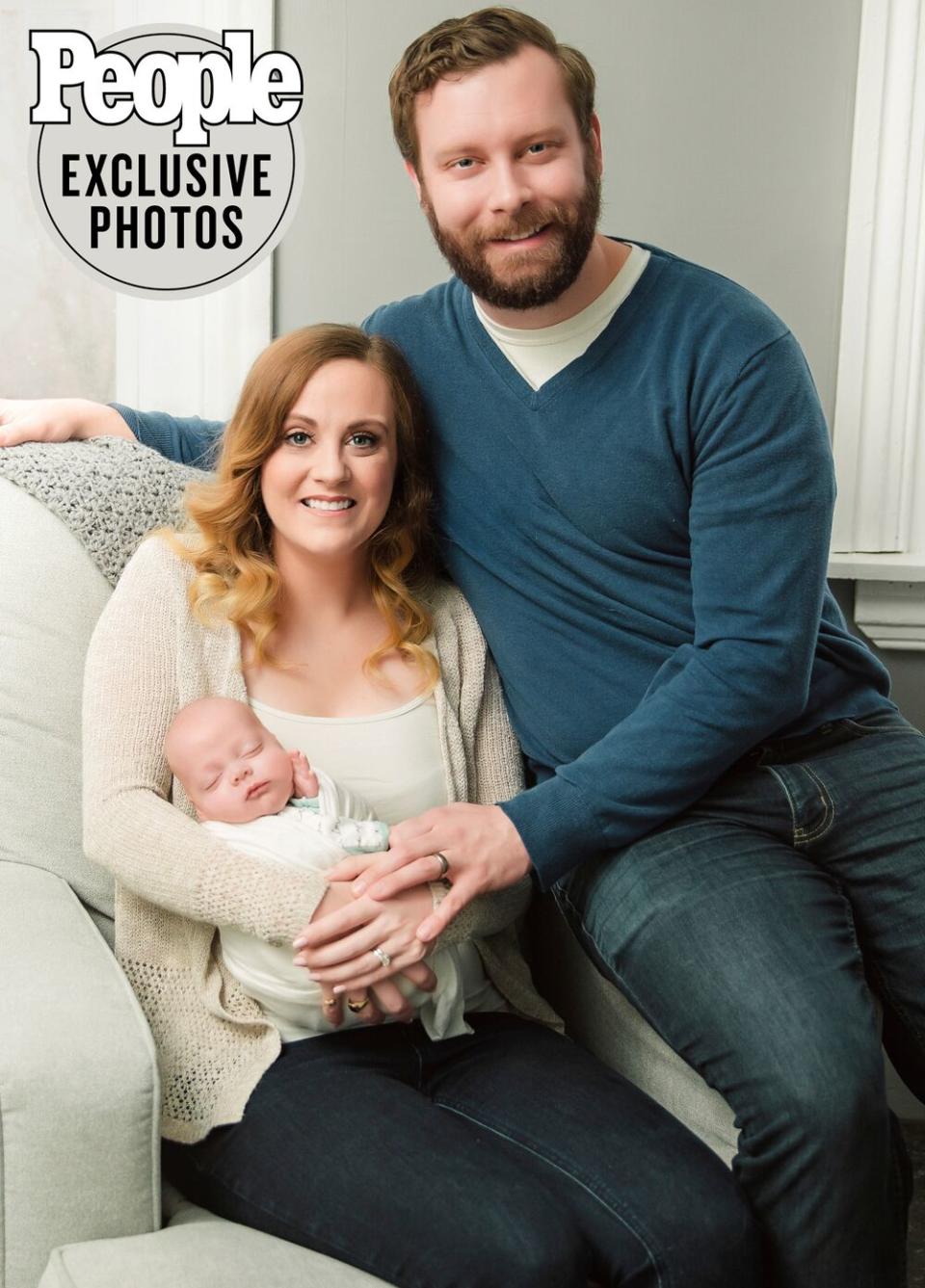Uterus Transplant Recipient Recalls Her Journey: 'I Was the Happiest Pregnant Person'
New mom Jennifer Gobrecht is looking forward to annual family trips to the Renaissance Faire. She can’t wait to take her 2-month-old son Ben to the beach and to Phillies games. He has burp cloths for every sports team in Philadelphia.
At her home in Ridley Park, Pennsylvania, the event planner decorated Ben’s nursery in shades of gray with a pop of Game of Thrones whimsy — on one wall is a giant baby dragon decal.
But it’s been quite a journey to get here. In November, Jennifer became the second woman in the U.S. to have a uterus transplant from a deceased donor. The 30-year-old says she had always wanted to be a mom. “I have truly great, strong role models,” she says of her mother and grandmother. “I loved the example they set.”

There was a time when it seemed like her dream of motherhood would not come true. That’s because she was born without a uterus, which doctors discovered when she was in high school. When she hadn’t starting menstruating by age 17, her doctor ordered an MRI. She was officially diagnosed with Mayer–Rokitansky–Küster–Hauser syndrome (MRKH).
“It was a difficult diagnosis,” she says. Before that, “I just thought I was a person getting a late period.”
When Jennifer met her now-husband Drew in college, she told him about her condition right away. When they married in 2014, they were determined to become parents — they just weren’t sure of the exact path.
In February 2016, they went through IVF treatments and created ten healthy embryos.
Through a Facebook group for women with MRKH, Jennifer learned that the Hospital of the University of Pennsylvania in Philadelphia was looking for women to volunteer for a uterus transplant. She thought she would be the perfect fit.
When Jennifer and Drew met with the trial’s medical director Dr. Kathleen O’Neill, she warned that there was no guarantee of success — yet plenty of risks.
Drew wasn’t sure he wanted to proceed. “Is this the journey we want to take?” Drew remembers asking as they walked out of the meeting.
But Jennifer told him that even if it didn’t work out in her case, she wanted help other women.
The idea was enough to persuade her husband to sign on.
When Jennifer was accepted into the study in fall 2018, she and Drew celebrated — with nachos.
Two months later, the couple were both working late one Friday night. Jennifer, an event planner, was prepping for a 300- person event and wasn’t answering her phone. Walking out of his office around 6 p.m., Drew answered a call from Dr. O’Neill, who had big news: There was an available uterus and doctors could do the transplant the next day. Drew called his wife and told her she had to take the call.
That night, again, they went out for nachos to celebrate.
The next afternoon they arrived at the hospital around 2 p.m. and binge watched “The Haunting of Hill House” on Netflix while they waited. The ten-hour transplant surgery went well, says co-principle investigator and transplant surgeon Dr. Paige Porrett, assistant professor of surgery at the University of Pennsylvania.
“This was the first time we had ever done this procedure,” Dr. Porrett says. “This is a unique procedure. A new procedure.”
About six months later, Jennifer and Drew got pregnant on the first try.
Again, the couple went out and celebrated with nachos.

Jennifer loved being pregnant.
“I was probably the happiest pregnant person,” Jennifer says. “I loved all the things people complain about — all the stretch marks. I liked being tired.” She says she never got morning sickness, and she “got the good hair and nails and the pregnancy glow.”
But mostly, she liked feeling her baby moving inside her.
“He was a very avid kicker. The first time he kicked, I think I cried for a good 20 minutes,” she says. “When we would go in for ultrasounds, we would see him flopping around. It was an amazing experience to be able to carry him.”
And while the birth in November was a few weeks earlier than expected, Jennifer says she felt surrounded by love in the delivery room as she prepared to give birth. Nearly 30 hospital workers were standing by for the momentous occasion.
“I had an extra support system that not everybody gets to have,” she says. “I definitely felt the love in that room.”
Drew held Jennifer’s hand, and told her she was doing great as the C-section was performed. Since the C-section was performed in a cardiovascular surgery operating room, Drew was able to watch the entire birth on a monitor.
“I know they traditionally put up a screen. But because we were in the cardiovascular surgery operating room, there were TV’s up showing everything. So I could see on the TV everything that was happening in the surgery,” says Drew, 32. “I was excited to see everything. I was bawling my eyes out in the operating room.”
The first time she held her son, Jennifer remembers crying as she cuddled him close and sang, “You Are My Sunshine.”
“It was such an intense moment for me,” she says.
Jennifer had the donor uterus removed immediately after delivering her son. The anti-rejection medicine compromised her immune system and there could have been additional long-term risks.
“Post-partum now, I feel 110 percent back to normal,” she says. “I can be a super mom to Ben.”
The entire medical team is incredibly happy for the new family, says Dr. Porrott.
“Jennifer is an inspiration,” Dr. Porrott says. “I just can’t say enough great things about her and her resilience, and her courage.”
Jennifer says Ben is a healthy, happy baby boy who loves eating, sleeping and snuggling.
“We feel so lucky,” Drew says. “This is the cool stuff.”
For more on about Jennifer Gobrecht’s uterus transplant, pick up this week’s issue, on stands Friday, Feb. 15.

